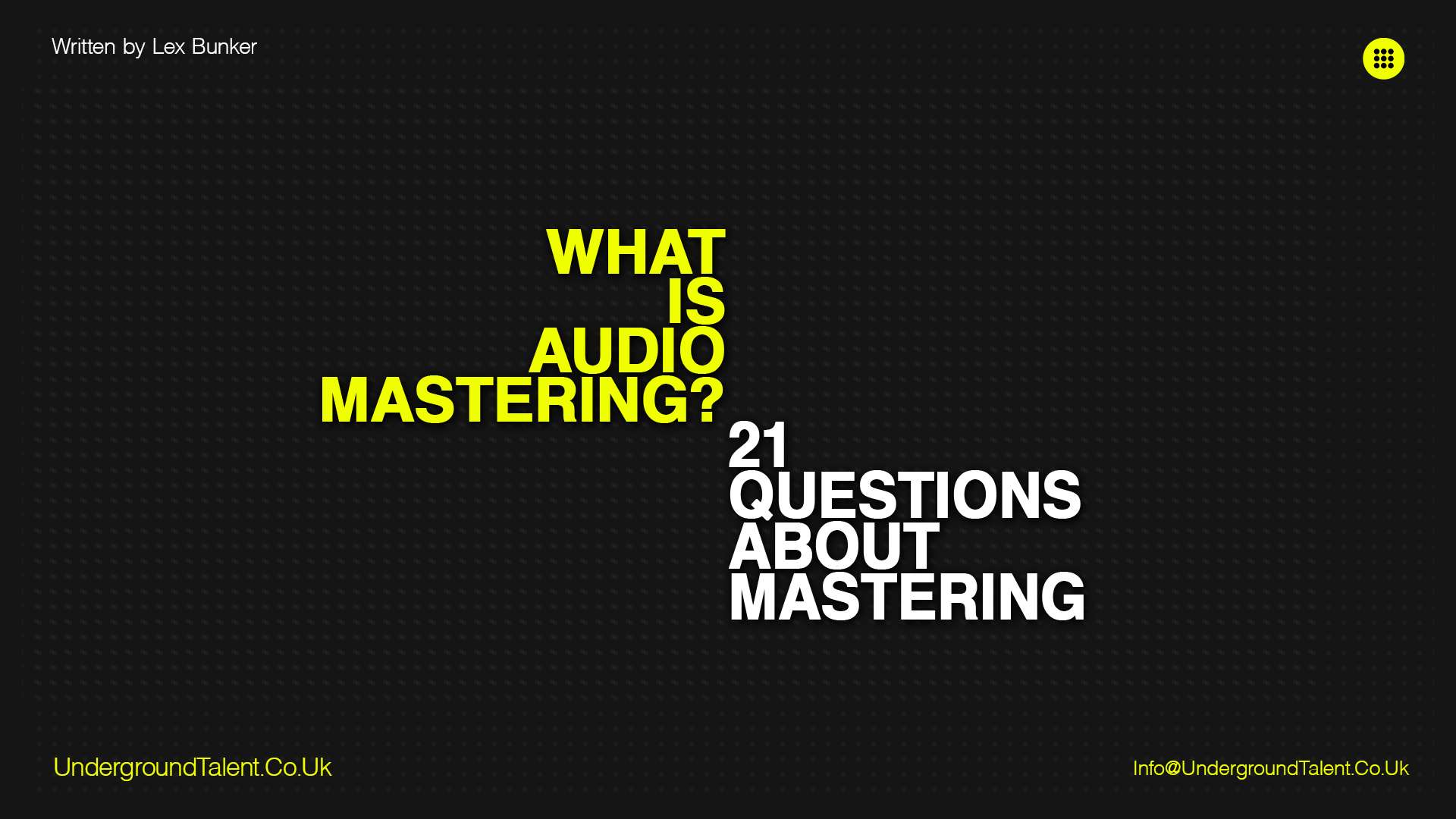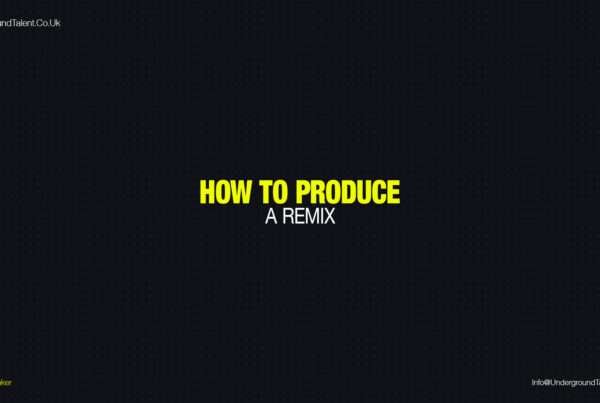What Is Audio Mastering?
Audio mastering is the process of taking an already-recorded audio signal and giving it a final quality that can be heard on any audio playback system.

Introduction: Audio Mastering
As a producer of electronic music, you know that audio mastering is an important step and that it can significantly change the sound of your tracks. But what exactly is it? How does it improve your music? and what does it mean? Mastering is a process that takes an audio sound recording and creates a final mix in a format ready to be distributed to the public. It is the process of taking a track or other audio recording and correcting its sound for optimal quality.
Audio mastering can be done by professional engineers, but it is also possible to do it yourself with a few simple tools. It can improve the quality of the sound by removing unwanted noise, improving the dynamic range, and making the track sound louder. Mastering can also be used to improve the sound of an existing track.
This is a guide where we provide the definitions for what audio mastering is, what it is not, and what it does to the music.
Don’t Miss: Top 10 Techno Music Artists of All Time
21 Questions About Mastering | Table of Content:
- What is mastering in music?
- What Is Digital Mastering?
- What Is Analog Mastering?
- What Is Online Mastering?
- Is Online Audio Mastering A.I.?
- What is the main purpose of mastering?
- Are mixing and mastering the same?
- What are the differences between mastering and mixing your tracks?
- Does a good mix need mastering?
- Do you really need mastering?
- What are the benefits and how can audio mastering improve my tracks?
- How do you master a track? The basics of audio mastering.
- What DAW do mastering engineers use?
- Can I master my own tracks?
- What skills are needed to be an audio mastering engineer?
- Is mastering not just loudness?
- How do you tell if your track is mastered properly?
- How long does it take to learn mixing and mastering?
- What gear or VST plugins are used for audio mastering?
- Can I study Audio Mastering?
- What are the best audio engineering schools or courses to learn how to master?
Don’t Miss: The Five Advantages of Techno by Lex Bunker
SHARES – INVITE FRIENDS TO EARN UP TO £200! | Sponsor
Download the Shares app and deposit at least £1 to get a free share worth £5. Once you’ve signed up you’ll be able to invite friends and earn £20 (cash) per referral. You can invite 10 friends – earning up to £200! Here’s the referral process:
- Download the Shares app
- Complete the sign-up process (you’ll need your ID for this)
- Once signed up get your referral link and start sharing it with friends
In order to qualify for the free £20, your friend needs to deposit £1 into your shares account.
Follow Underground Talent on Instagram and please support us on our mission by subscribing to Underground Talent’s YouTube Channel.
21 Most Common Questions About Audio Mastering
What is mastering in music?
Mastering starts with the final mixdown, which is the process of mixing the final stereo or mono mix of a track with the individual tracks, and adjusting the levels of the tracks to make them audible.
Next, a mastering engineer will listen to the final mix and decide what changes need to be made. They may use EQ, compression, limiting, or even reverb to make the sound more appealing. Audio mastering is an art form in and of itself, with many different approaches taken by professional engineers.
Read Also: Behind the Scene Interview with Lau.Tastic
What Is Digital Mastering?
Digital mastering is the process of optimising your music for digital distribution. It is a set of tools that professional audio engineers use to make sure your music sounds as good as possible when it is distributed digitally.
The goal of digital mastering is to remove any unwanted noise or distortion from your audio file and make it sound clean and crisp. It can also reduce the size of your audio file, which will save you money in the long run. Digital mastering has become an essential part of the music production process.
What Is Analogue Mastering?
Analogue mastering is the process of recording a digital audio file to an analogue medium such as a tape or vinyl record. Analogue mastering can be done for many different reasons, but the most common one is to create a high-quality vinyl record or tape.
These analogue masters are then used to make copies of the record or tape that are called “stereo master” records or tapes. These copies are then sold to pressing plants where they are pressed onto vinyl records or tapes.
Don’t Miss: TØLR – Exclusive Interview with the Bulgarian Techno Artist
What Is Online Mastering?
Online mastering is a service that helps you to create and share your music in the form of audio files. Online mastering will allow you to listen to your music on any device, including your phone, computer, or even in your car.
The service can also be used to make your music available on streaming services such as Spotify, Apple Music, and Tidal. With Online Mastering, you can also choose to save your files as MP3s or WAVs.
Is Online Mastering A.I.?
Yes, online audio mastering is artificial intelligence. Usually, they have an easy-to-use UI and can improve your sound quality and a very low price. Good online mastering is depending on the good quality of your mix. By any means, A.I. mastering it does not replace your mastering engineer, not yet!
Read Also: QUEENSYZE – SMELLS LIKE ACiiD | EP of the Month + Exclusive Interview
What is the main purpose of mastering?
The main purpose of audio mastering is to optimise the sound quality of a recording. It is the final stage of the production process, after mixing and before pressing, and is performed on a digital audio workstation (DAW). The goal of audio mastering is to produce a high-quality digital master for release to the public.
What DAW do mastering engineers use?
Here are the top and commonly used software for audio mastering by professional engineers:
- Samplitude
- Sequoia
- PYRAMIX
- Steinberg WaveLab
- Reaper
- DSP Quattro
- Triumph
- Steinberg Nuendo
- Ableton
- Avid Pro Tools
- Logic Pro
- Steinberg Cubase
Are mixing and audio mastering the same?
No, they are not. Both mixing and mastering belong to the post-production process, but they are not the same.
Don’t Miss: The Greatest Albums of All Time | A Letter From the Past
What are the differences between audio mastering and mixing your tracks?
In mixing you are processing every file individually and in audio mastering, the engineer is optimising your stereo output, also known as the export, in a form ready to be distributed to the market.
Does a good mix need mastering?
Yes, even a perfect mixdown needs audio mastering.
Do you really need audio mastering?
Definitely. Otherwise, your track will have issues in translating the stereo output signal into different audio devices.
What are the benefits and how can audio mastering improve my tracks?
Audio mastering is a process that is used to enhance the overall sound quality of a recording. It can also be used to clean up a recording that has been badly mastered in the past.
Mastering is often used in the music industry, but it can also be used to enhance any type of audio. Audio mastering is a process that takes the raw audio file and enhances it.
Here are some of the benefits of audio mastering include:
- Properly balancing the volume levels of all the different parts of the song
- Fixing any flaws in the sound
- Removing unwanted sounds and noise
- Removing any unwanted frequencies
How do you master a track? The basics of audio mastering.
Audio mastering is the process of preparing a sound recording for release or broadcasting. It is typically the last stage in the production of a music recording.
Audio mastering is used to prepare a sound recording for release or broadcasting. It is typically the last stage in the production of a music recording. The goal of audio mastering is to produce a sound recording that sounds as close as possible to what the artist intended.
Here are some of the basics of audio mastering:
- Listen to the final mix and take notes
- Create an audio analysis of the track
- Equalising to fix the sound and tonal balance
- Compressing to control dynamics range
- Saturating to improve colour in your track
- Stereo widening for depth
- Loudness maximisation
Read Also: July’s EP of the Month with Gonzalo MD
Can I master my own tracks?
Absolutely, but it’s better to avoid mastering your own tracks if it can be done by a professional audio engineer. It is a process that requires a lot of knowledge, skills, and time. If you are looking to learn how to master your own tracks, it is best to start with simpler songs that are easier to master.
It’s a very challenging job that requires a lot of patience and dedication. There are many things that can go wrong when mastering an audio file, but the most common is clipping. If you’re having trouble mastering your own audio files, you should try to find someone who has mastered their own audio files before. You should also try to find someone who has mastered the same type of audio file as you have to ensure that you will get the results you want.
Learn to master your own tracks to gain knowledge and to be able to test your tracks on the dancefloor. In this way, you can see what works and what does not before deciding to release them to the market.
Don’t Miss: Brutalism by Erald | Free Sample Pack
What skills are needed to be a mastering engineer?
If you have an interest in audio mastering, you will need to have a thorough understanding of sound and music theory. This is because the job of an audio mastering engineer is to give a piece of music the best quality possible. The skills that are needed to be an audio mastering engineer include being able to take a song’s recording and make it sound like it was recorded in a studio.
In addition, it is also important to be able to work with different instruments and sounds, such as guitars, drums, vocals, and more. In order to do this, the person needs to have a good sense of the frequency range and how each instrument works with the others.
Professional audio mastering engineers work to create and make final adjustments to the audio files for a product. They work in studios and are responsible for the final sound of a product, such as music, movies, or advertisements. It is important to have good listening skills, be able to multitask and be comfortable with computers. It is also important to have good customer service skills because they will often be dealing with the people who work on the audio files.
Is audio mastering not just loudness and limiting?
Loudness is a big part of mastering. The process as a whole isn’t just about making your tracks louder. Mastering frequently consists of increasing the final volume to make it louder, but there is far more to mastering than just turning the volume up. Mastering is not a repeatable process or a VST plugin chain. Not every track needs the same things to sound its best.
Limiting is the final step in audio mastering and is arguably the most important process. Its main purpose is to make your music as loud as possible without clipping or distorting it.
How do you tell if your track is mastered properly?
A mastered track is loud and it doesn’t Clip. It should be done in the highest resolution and avoid over-processed mixing or multiband compression for better results in your mixdown. Make full use of the headroom to let your channels breathe in their own space and make sure that your mastered track has balance.
Mastered tracks must sound good on all sound systems and similar to other already released tracks, which you can reference during the mastering process. Your drums should cut through and no element should jump out of the mix. Everything in a mastered track must blend in well with the rest in a that makes sense.
If you master with a reason from the start, you will know if the track is mastered well, and you can get an outside opinion before your final decisions.
Don’t Miss: Audiocult – Connect with the Dance Music Industry
How long does it take to learn to master?
Audio mastering is a difficult process that takes a lot of time and dedication. It is not something that is easy to learn and master. It can take up to two years to learn the basics of audio mastering, but it is worth it in the end. Audio mastering is the process of taking a song or an album from its original form and giving it a polished, professional sound. Audio mastering is all about the details, which means that you need to know what you are doing before you begin.
Learning audio mastering can take a long time and requires a lot of practice. It is not something that you learn overnight, but it is possible to learn with enough dedication and practice. The process starts with learning how to record a song and how to use the software needed to master the song.
There are many different types of software that can be used for mastering, so it’s important to research what you need before you even start. Once you have learned how to record and use the software, you will have to learn how to mix, which is a different process than mastering. Mixing is used for adjusting the volume levels of different parts of the song and getting rid of any unwanted sounds. With practice, you will learn the skill of mastering and will be able to start using it on your own songs.
What gear or VST plugins are used for mastering?
Here are some analogue equipment and tools which is used in mastering:
- Audio Interfaces
- Digital Audio Workstations
- Equalizers
- Compressors
- Multiband Compressors
- Limiters
- Monitors/Loudspeakers
- Harmonic Enhancers
- Headphones
- Cables
- Power Conditioners
- Analysers
- Audio Restoration Software
- Audio Editing Software
- Conversion Software
- DAW Software
Check out the twenty most commonly used VST plugins for mastering right now:
- Waves – Abbey Road TG Mastering Chain
- Eventide Elevate Bundle
- iZotope Ozone 9
- Brainworx bx_XL V2
- Tonal Balance Control 2
- Brainworx bx_masterdesk
- UAD SSL 4000 G Bus Compressor
- Mastering The Mix Reference 2
- Mastering the Mix Expose
- Softube Curve Bender
- FabFilter Pro-MB
- FabFilter Pro-L 2
- FabFilter Pro-Q 3
- S1 Stereo Imager
- Shadow Hills Mastering Compressor
- Melda Productions MDynamics MB
- Nugen MasterCheck Pro
- Soundtheory Gullfoss
- Cytomic The Glue
- Eventide Elevate Mastering Bundle
Can I study Audio Mastering?
Yes, you can! If you are interested in Audio Mastering, you can ask yourself the following questions to help determine if it is the right career path for you.
- Am I passionate about music?
- Do I enjoy working with people?
- Do I like a variety of tasks?
- Do I have an interest in sound production?
- Am I a fast learner?
- Do I have an interest in the music industry?
What are the best audio engineering schools or courses to learn how to master audio?
Audio engineering is a profession that involves the designing, recording, mixing, and mastering of sound for motion pictures, radio, television, music, and other audio media. This process can be broken down into many different steps that all need to be mastered in order to produce a professional-sounding product.
There are many different courses and schools that specialize in the field of audio engineering. You should choose a school that offers courses that are related to the type of audio engineering you want to do. Some common courses include music composition, audio production, audio recording, audio editing, and audio mastering.
Have a look at some schools and courses available right now in audio engineering:
Find and links
Read Also: ØLMØ| Behind the Scene Interview
Conclusion About Audio Mastering
We hope you enjoyed our blog about the twenty-one questions that everyone asks about mastering. If you’re unsure what mastering is, we hope that this article provided some insight into the step so you can feel confident in your decision and keep the quality of your tracks at its finest. And yes, we know that mastering can be a difficult and confusing process, but we hope that answering these questions, will help you better understand mastering and what it does and how it will improve your music.
In our next article on this subject, we will discuss how to properly prepare your tracks for mastering. If you have any other questions, please don’t hesitate to reach out to us on our Instagram page or by emailing us at Info@UndergroundTalent.co.uk. Thank you for reading, we would love to hear from you!
Read Also: Aldanya | Behind the Scene Interview
And Always Remember…
Have Fun & Be Creative!




